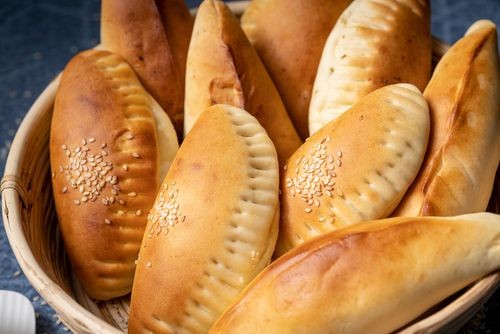Russia – Ukraine war results in price hikes in Iran
We've run a number of articles recently talking about the affects of the Ukraine-Russia War on the Middle East, primarily involving the effects of wheat and grain prices. Here is an article on Iraq that talks about that.
By Ayser Jabber for Al Monitor.
The global economic crisis due to the Russian-Ukrainian war has led to price hikes in Iraq. This has prompted the Iraqi government to amend several decisions related to the import of goods, especially foodstuffs, instructing the internal security forces to monitor markets and prices.
The prices of some foodstuffs, especially wheat-derived goods, such as pastries, in addition to cooking oil, has increased by 20%.
Consequently, the Iraqi government is now paying 30% more to Iraqi farmers for their wheat. This aims to support local farmers and ensure that they sell all their products for domestic use. The government is also offering loans to farmers through the Agricultural Bank and other Iraqi banks.
Baghdad has decided to grant poor families 100,000 Iraqi dinars ($68). It also opened imports for a period of three months for all foodstuffs without exception, so all products could be amply available in the market.
The Iraqi government has also proposed the Emergency Support Law for Food Security and Development, which had its first reading in Parliament on March 28. Most importantly, it stipulates that the Ministry of Finance shall create a fund called Supporting Food Security and Development, Financial Precaution and Poverty Alleviation. Funding would come from excess expenditures allocated in the budgets, in addition to grants given to Iraq as aid.
However, the law was rejected by the Coordination Framework blocs and some independent MPs, who believe the law will pave the way for corruption due to the lack of a federal budget.
The current ration card program covers 10 commodities: rice, sugar, tea, oil, flour, lentils, beans, yellow corn, tomato paste, and some cleaning materials such as soap. The law aims to maintain food security by providing more funds for the ration card program, in addition to supporting an integrated food basket project that will be distributed to poor families.
MP Alia Nassif said in a statement that it is impossible to pass the law as it was drafted because it legitimizes corruption.
Meanwhile, other MPs defended the draft. Mishaan al-Jubouri, a member of the Parliamentary Finance Committee, told the press that the law will provide sufficient funds to distribute 12 food items to citizens instead of 10, noting that his committee is looking into other means to support the poor, as well as the agricultural sector by supporting farmers.
The Iraqi government, during Saddam Hussein's regime, began distributing a number of ration card items to the general public in September 1990. The card is available to all Iraqis and allows them to purchase certain basic goods at affordable prices. Cardholders cannot buy additional quantities at a subsidized price, but they can buy these goods at the usual market price.
Mahdi Damad al-Qaisi, advisor to the Ministry of Agriculture, told Al-Monitor that Iraq has the financial capabilities to overcome this global crisis. Iraq imports its most important food crop, wheat, from the US and Australia. "However, other countries that rely on Russia and Ukraine may now resort to the countries Iraq imports from," he said. "The concerned authorities must take precautions, including us in the Ministry of Agriculture, because our agriculture is limited, especially in terms of wheat."
He added, "Besides wheat, we face an issue with animal feed, such as corn, most of which is imported, in addition to animal fertilizers."
Qaisi stressed that the private sector has a major role in staving off all these concerns if it is given an adequate opportunity and support by the Iraqi government, although the National Product Protection Law has not been not implemented.
The law was passed in 2010 to protect products manufactured in Iraq to maintain fair competition between the local products and the imported ones, but it has not been implemented; imported products enter both legally and illegally into the Iraqi market with relatively low prices.
"Chaos at the Iraqi border crossings with the exporting countries does not allow the national product to compete with imported products, which negatively affects the work of the private sector," Qaisi noted. "Some commercial circles have indicated that the best solution to control the market and curb any rise in prices is to support the Iraqi trader by protecting their products, facilitating the entry of the goods they need from the ports as well as reducing customs fees."
Fadel al-Zubi, former representative of the Food and Agriculture Organization of the United Nations (FAO) in Iraq, told Al-Monitor that the food security situation in Iraq is critical and requires caution.
"Amid global speculation, global prices rose, although prices were somewhat stable in late March compared to the beginning of the month when prices rose by 20%, aided by the precautionary measures taken by most importing countries to secure supply," Zubi said. He added that high oil prices now enable Iraq to afford wheat even with high prices, if decision-makers move quickly.
However, Jawad Amir, a chemistry professor residing in Baghdad, told Al-Monitor that all the measures that the government has worked on cannot help the simple Iraqi citizen.
"Citizens are directly affected by price increases. Meanwhile, salaries and social aid remain the same. This shows that the concerned authorities have no control over the Iraqi market, and this raises concerns among citizens," Amir explained.
The poverty rate Iraq has reached 23%, according to the Iraqi Ministry of Planning, and unemployment rates have reached 14%, especially in the southern and central governorates. Concurrently, suicide cases have increased as many find themselves unable to provide for their families in a politically unstable country.
Today, Iraqis are at the mercy of measures that the government said will help protect food security.
Read more: https://www.al-monitor.com/originals/2022/04/iraq-grapples-rising-food-costs-result-ukraine-war#ixzz7RkOeYG4q


Comments